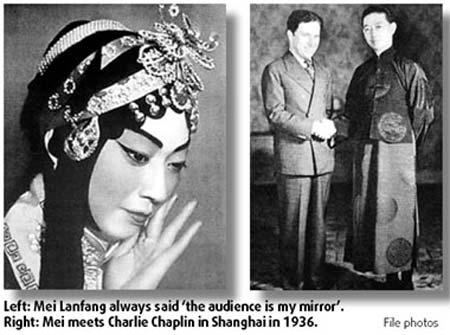Source:
10-31-2008 17:04
When foreigners visit Beijing, their Chinese friends often recommend Peking Opera as a must-see. However, it is not easy for someone who knows little about Chinese culture to fully appreciate the charm of the 200-year-old performing art. Learning about the life of an extraordinary Peking Opera actor therefore, could be a rewarding endeavor.
 |
Nearly 50 years after Mei Lanfang (1894-1961) passed away, most Chinese still associate his name with Peking Opera. This has little to do with the fact that he was the first President of the Chinese Academy of Peking Opera in the 1950s. He lives in people's hearts as some of the most famous female images in Peking Opera, one of hundreds of folk operas in the country.
Throughout his life, Mei remained a humble student of anything he deemed helpful to Peking Opera. Learning from other folk operas, modern drama, painting, poetry and Western art, he made daring innovations in script, performance, singing, costume, make-up, stage prop, lighting and musical instruments. His love of Kunqu Opera, a predecessor of Peking Opera, was instrumental for the 600-year-old opera's revival.
Since he debuted in the minor role of the Weaver Girl at the age of 11, Mei specialized in graceful and dignified ladies (qing yi - blue dress) until 18.
When a qing yi character entered the stage, it was required that the actor must show no expression, with one hand by the side and the other on the stomach. The aficionados would close their eyes, wave their head and clap their hands with the singing.
Mei's grandfather Mei Qiaoling had tried to improve such roles by merging elements of a more lively genre named hua dan (colorful female role). Despite harsh criticism, Mei Lanfang went further to learn daoma dan (broadsword and horse female role).
Such cross-disciplinary learning was decisive for him to bring more glamour to the leading role in Concubine Yang Gets Drunk (Guifei Zuijiu). When he staged the show in Japan, the United States and the former Soviet Union, numerous audiences were won over by the brilliant attire, elegant movement and unforgettable singing.
